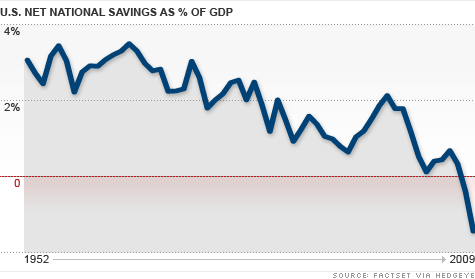“There Goes My US Economy: Where Have All The ‘Savers’ Gone?”

We’re witnessing a turn of events transpire right before us. It doesn’t take a fortune telling psychic to predict what could potentially happen next. Because of our ill-advised macroeconomic policies, monetary mismanagements and all-around economical tomfooleries, the U.S. economy is surfing towards an almost certain “wipe–out.” What appears to be at the helm of this concern is very obvious: the US economy lack of savers.
A Monetary System That Lacks Savers
It’s already been established, the U.S. is suffering from one the worst savings rate in its economic engine’s history. How important is the savings rate to an economic monetary system? I would say very important! Whenever you place monies into a savings account, you’re forgoing today’s consumption of durable goods and services, for the possibilities of tomorrow’s consumption. What this “deferred consumption” means to a monetary system is tenfold—specifically, it removes dollars out of circulation, thereby decreasing the risk of inflation— which, as we all know, drastically reduces a currency’s purchasing power. In fact, vis-à-vis other significant economic variables, the savings rate is among one of the most important in determining the general strength of a nation’s currency. Jacob Deroy, author of the book Economic Literacy, describes the savings rate as follows:
Similarly, the savings rate is important because real savings are the economy’s “seeds” that it uses to produce things in the future. Savings are also used to give banks the funds that they lend out to individuals who build houses and to business that build factories. Savings are also used to purchase newly issued stocks and bonds from corporations.
The sad truth is, Americans have a problem with saving their money. How can the U.S. economy ever climb out of the economic doldrums with close to a zero savings rate? In the distance past, our economic engine was the epitome of savers: following WWII, banks used massive savings to loan monies to business; which, in turn, used those funds to buy inventory, construct new production facilities, and to purchase machinery and equipment, etc.
In a market based economy savings is very important because it’s inherently intertwined with investment. Without savings, there’s no investment, and without investment, an economic engine can’t run. What’s considered an investment? Oddly enough, it goes beyond what many perceive it to be—i.e., savings account, stocks, bonds, promissory notes, etc. In economic terms, investment primarily means acquiring something that can be used for the production of a good or service.
The dichotomy between whether savings is invested or whether it fluctuates in nominal value as an investment is one in the same: the importance of savings to any market based economy and its monetary system is as important as anything. Economics have shown, over the long-term, to reward economies that advocate savings verses economies that don’t. An added incentive to a high savings rate is that in the long-term it tends to act as a natural hedge against inflation. Take the Japanese economy, for example, it has become a living testament to this dictum. Because the Japanese people aren’t averse to savings, the Japanese economy has never had and will never have issues of high prices. In fact, the Japanese economy has been in a decade long deflationary period.
Savings The Key Component To A Revived Economy
According to a number of statistics, personal savings have reached its lowest numbers since the Great Depression. As I write this hub, the U.S. savings rate is on the brink of disaster. This isn’t a joke! The average U.S. consumer is as eager to put away his/her money, as he/she willing to take a bullet to the brain. The magnitude of this “anti-savings” mantra—on the part of the American people—could spell an almost certain economic calamity—that is, of course, if the U.S. government doesn’t start discouraging Americans to consume in this country.
Why is it that the American government's continuously trying to get the American people to consume? We have Black Friday, Cyber Monday, etc—American is no longer a place where people save first and spend second. Because of all these ridiculous holidays, the American people have been duped into believing—that in the best interest of the economy—we should all spend like crazy. Shopping is no longer considered leisure, it’s now considered our national pastime. Because of this abject materialism, within the American landscape, the American economic engine has been slowly heading down a very narrow financial path of no return. How did all this transpire? Well, at some point in the post-developmental stage of our economic engine, Americans stopped loving the idea of savings and fell in love with the art of consuming—namely, buying things for the sake of just buying them. Any astute market economist will tell you the same thing: “the only true way to garner sustained economic growth is through adequate savings.”
Savings and Its Long-term Benefits To An Economy
What any good market economist will tell you that—for long term things like retirement and Medicare—an economic engine needs savers. Without savers, some where down the line, an economic engine (even as great as ours) will stall. This latest “Great Recession” is living proof that we’re in that pre-stall mode; the thing we have to do now is assuage the damages from an almost certain “real thing.” I say “real thing,” because it doesn’t seem likely that the American people will suddenly end their art of consumerism. What’s consumerism? The American Heritage Dictionary defines consumerism as follows: "The theory that a progressively greater consumption of goods is economically beneficial.” Broadly speaking, consumerism is a socio-economic phenomenon that’s based on the systematic creation of an abject desire to purchase frivolous amounts of goods and services in an advanced market economy. It’s this same consumerism that’s cause for long-term economic concern in this country.
How are we going to provide for tomorrow’s retirement and medical needs? How are we going to provide for tomorrow’s remedial care of an aging baby-boomer generation? The answer to those and many other questions lies with today’s savings. Savings is the reason why our economic engine has reached this juncture of economic grandeur in the first place; and it’s been the key variable in a very important economic growth equation: national saving = investment + net exports (S = I + X). The hidden underlining truth that the US government conceals from the American people is that the U.S. is a rich nation that saves like a poor nation. Even to the most novice of economists, the richest country on the planet, not being able to save, is something out of a bizarre wonderland.
In conclusion, the more monies Americans put aside today, the more they’ll have available to spend tomorrow. In addition, an important feature of savings is its reference to pension plans: these plans give American citizens suitable purchasing power during their retirement years. Just why aren’t Americans saving like they did in previous years shouldn’t be a mystery anymore: they've adopted a very dogmatic consumption driven ideology from "big gov." that tells American people market participation is mandatory: the very idea that the free market process is voluntary has blown away with the winds. Fact is, a country without a sizable savings is a country with a future currency without sizable purchasing power.







